A Christmas Carol, Policy Violence, and Epicurus' Advice for Living Well
Humanizing the Times: From December 13, 2024 to December 20, 2024
Index of What’s in Store
Profitless Joy, a Lesson from a Classic Christmas Ghost Story
Policy Violence vs. Homicide, Insight from Coretta Scott King and Friedrich Engels
“You People are Next!” Terrorism or Forceful Free Expression?
Who’s the Sicko? Michael Moore Responds to Mangione’s Name-Drop
Drop Site News’ report: “Our Job Is to Flatten Gaza. No One Will Stop Us.”
Profitless Joy, a Lesson from a Classic Christmas Ghost Story
December 22, 2024
Some experiences, like a kiss, embracing a loved one, or playing a game, are good in themselves. Sure, there are secondary benefits to human connection and play like stress-relief and boosts of our immunity. But we don’t reach out to hug people in the same way we reach for medicine. The benefits of human connection and play are a secondary outgrowth of the intrinsic value or goodness of meaningful human touch. The experience of the right kiss or right embrace is just good because loving connection is itself good.
We could say the same about behaving justly or speaking truthfully. Yes, good often comes out of fairness and honesty, but being just and truthful are good in themselves. And we miss so much of what is good in life when we focus exclusively on the “results” or aftermath of our experiences.
Of course it's perfectly reasonable to consider the consequences of our actions. Many of us promote just policies, for example, because we want to generate effects like reducing suffering. But we shouldn’t let that legitimate ethical objective overtake the humanistic awareness that there is good speaking the truth, affirming human dignity, and striving for justice even when we fail to generate our preferred outcomes.
The value of life is not mainly to be found in the perpetually receding horizon of the future. Life's principle value is discovered in our fully enlivened participation in the present. A Christmas Carol teaches us this very lesson.
Early on in Charles Dickens’ classic Christmas ghost story, the character Fred greets his cantankerous uncle, Ebenezer Scrooge in the cheerful spirit of Christmas. “‘A merry Christmas, uncle! God save you!’” But Scrooge is sickened by the frivolity of it all. “‘Bah!,’ said Scrooge. ‘Humbug!’”
When Fred asks why Christmas agitates him so, Scrooge denounces the foolishness of the holiday.
“‘Merry Christmas! Out upon merry Christmas! What's Christmas time to you but a time for paying bills without money; a time for finding yourself a year older, and not an hour richer; a time for balancing your books and having every item in ’em through a round dozen of months presented dead against you? If I could work my will,’ said Scrooge, indignantly, ‘every idiot who goes about with “Merry Christmas,” on his lips, should be boiled with his own pudding, and buried with a stake of holly through his heart. He should!’”
Fred is unmoved by Scrooge’s apoplectic diatribe against Christmas. He counters that the best parts of life are not weighed and counted in silver and gold.
“‘There are a many things from which I have derived good by which I have not profited, I dare say,’ returned the nephew: ‘Christmas among the rest.’”
Fred rebukes the cynic’s attack against the holiday spirit. At its best, the Christmas season is
“a kind, forgiving, charitable, pleasant time: the only time I know of, in the long calendar of the year, when men and women seem by one consent to open their shut-up hearts freely, and to think of people below them as if they really were fellow-passengers to the grave, and not another race of creatures bound in other journeys. And therefore, uncle, though it has never put a scrap of gold or silver in my pocket, I believe that it has done me good, and will do me good; and I say, God bless it!’”
In a final thrust to exemplify the very spirit of Christmas he has just outlined, Fred urges Scrooge to join him and his wife for Christmas dinner and an evening of cheer. Scrooge, in reply, seizes the invitation to insult his nephew’s decision to get married, mocking love as the “one thing in the world more ridiculous than a merry Christmas.” Scrooge makes it clear Fred cannot shake his misanthropic egoism, and the two men part ways.
Scrooge remains insulated from Fred’s wise words until later when visited by the Ghost of Christmas Present. The Ghost takes him to watch as Fred and his wife along with family and friends heartily laugh over a delectable meal. “If you should happen, by any unlikely chance, to know a man more blessed in a laugh than Scrooge's nephew,” the story's narrator commented, “all I can say, is I should like to know him too. Introduce him to me, and I'll cultivate his acquaintance.”
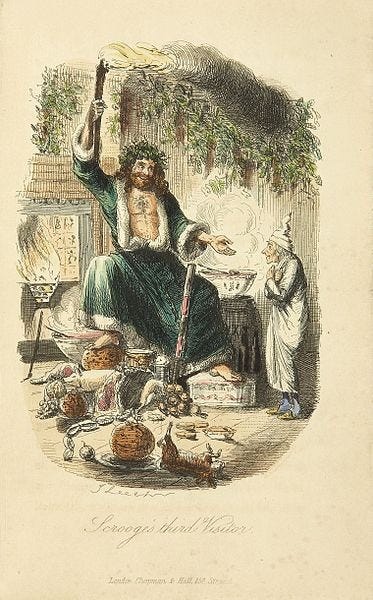
When Scrooge comes up in conversation, everyone bemoans his curmudgeonly ways. But Fred insists Scrooge harms none but himself in spurning the couple’s dinner invitation. Uncle Scrooge’s “offences carry their own punishment, and I have nothing to say against him.”
When one of Scrooge's nieces points to his wealth, Fred retorts that his wealth does neither him nor anyone else any good. By refusing the company and friends alike Scrooge deprives himself of more than he deprives of others.
“… the consequence of his taking a dislike to us, and not making merry with us, is, as I think, that he loses some pleasant moments, which could do him no harm. I am sure he loses pleasanter companions than he can find in his own thoughts, either in his moldy old office, or his Dusty chambers. I mean to give him the same chance every year, whether he likes it or not, for I pity him.”
Fred recognizes that his uncle is a victim of his own masochistic egoism. Scrooge’s heart is thawed not only by the fire of his nephew's empathetic critique but also by the gentle and joyful warmth of laughter, music and play. For the story’s instruction to appreciate the profitless joys of life isn’t only taught didactically, but also through exemplification in the behavior of the characters Scrooge observes.
Scrooge watches on as dinner gives way to music and singing. He sees children and adults joined together to play “forfeits,” a game in which participants must undergo a challenge to reclaim a contributed possession. They also play a game of tag and identification called “blindman’s buff,” and guessing games including “How, When, and Where” and another called “Yes and No.”
Scrooges’ observation of the games, which he vicariously participates in, move him to become “gay and light of heart.” The truth of Fred’s earlier claim had become clear. Some experiences, from Christmas to play to social gatherings, possess a worth that defies metrics of profit and loss. Their profitless worth is immeasurably valuable.
This holiday season, let us take time to contemplate those “profitless” experiences from which we derive our greatest goods. May we all work to relegate profit to its proper position as subordinate to life-affirming joy, love, and justice.
A Christmas Carol and an Injunction to Care
December 20, 2024
In Stave IIII of A Christmas Carol, the Ghost of Christmas Present reveals to Ebenezer Scrooge that Tiny Tim is likely to soon die if his family's fortune does not change. The disabled boy’s father, Bob Cratchit, is Scrooge’s loyal employee, whom he exploits.
Scrooge decries the prediction and begs for the boy to be saved. In reply the Spirit repeats words Scrooge had recently spoken when asked for a Christmas donation to help the poor: “‘If he [Tiny Tim] be like to die,’” spoke the Ghost, mocking Scrooge's callousness, “‘had he better do it, and decrease the surplus population.’” The quote moved Scrooge to an edifying shame.
“‘Man,’ said the Ghost, ‘if man you be in heart, not adamant, forbear that wicked cant until you have discovered What the surplus is, and Where it is. Will you decide what men shall live, what men shall die? It may be, that in the sight of Heaven, you are more worthless and less fit to live than millions like this poor man's child. Oh God! to hear the Insect on the leaf pronouncing on the too much life among his hungry brothers in the dust!’”
This holiday season, let us first investigate our own heart and its moral inconsistencies. Who have we overlooked? And is there something within our power to do to help others? Then, and only secondly, let us ask the question, who like Ebenezer Scrooge behaves as an “insect upon the leaf” pronouncing who among him deserves to live and who is entitled only to die? Christmas, at its very best, calls us to undertake this inquiry. Or so says Charles Dickens.
Policy Violence vs. Homicide, Insight from Coretta Scott King and Friedrich Engels
December 18, 2024
It is noteworthy how differently our mainstream social and media institutions respond to singular killings allegedly done by an individual such as Luigi Mangione compared to the systematic decisions of economic and military institutions that result in significantly more death and suffering. For example, the current administration’s ongoing support for the perpetration of what Amnesty International describes as a “genocide” being carried out by Israel in Gaza.
In the U.S. media, it is deemed a legitimate position worthy of prime-time exposure to argue Israel’s killing of tens of thousands of innocent civilians including countless children is a “necessary evil” to achieve a supposedly “greater good.”
By contrast, the many Americans declaring that Luigi Mangione’s killing of the UnitedHealthcare CEO may have been a “necessary evil” to achieve a “greater good” is deemed so extreme and intolerable that it is virtually criminal to express.
In a world where logical consistency and the Kantian ethical commitment to the dignity and inherent worth of all of humanity prevailed, the destruction of individual life to achieve some greater aim would be universally condemned.
To the extent that society has decided to embrace a utilitarian ethic, there will inevitably be greater tolerance for the cold and calculating consideration of costs and benefits produced by an action.
What is clear is that the dominant discourse around violence, namely who gets to do it and for what reason, is dictated by a narrow set of interests. Elite political, economic, and media condemnation of Mangione’s act of violence, one he acknowledged as “brutal” in his manifesto, rings hollow and inauthentic—selective—against the backdrop of what many human rights experts have deemed a genocide.
And this is to say nothing of the policy violence, as Coretta Scott King described it in 1968, of bureaucratically sentencing people to death through policy choices that deprive human beings of their most urgent need for healthcare. A 2009 study titled “Health Insurance and Mortality in US Adults” estimated 44,789 die annually due to lack of healthcare in the United States. By comparison, there were less than 17,000 homicides in 2009 and fewer than 25,000 in 2022.
“In this society, violence against poor people and minority groups is routine,” explained King during an address before the Poor People's March on Washington, D.C., June 19, 1968. “I remind you that starving a child is violence. Suppressing a culture is violence. Neglecting school children is violence. Punishing a mother and her child is violence. Discrimination against a working man is violence. Ghetto housing is violence. Ignoring medical needs is violence. Contempt for poverty is violence. Even the lack of will power to help humanity is a sick and sinister form of violence.”
More than a century before King’s address, Friedrich Engels described the “social murder” endured by poor people. In The Condition of the Working-Class in England (1845), Engels wrote,
“when society places hundreds of proletarians in such a position that they inevitably meet a too early and an unnatural death, one which is quite as much a death by violence as that by the sword or bullet; when it deprives thousands of the necessaries of life, places them under conditions in which they cannot live – forces them, through the strong arm of the law, to remain in such conditions until that death ensues which is the inevitable consequence – knows that these thousands of victims must perish, and yet permits these conditions to remain, its deed is murder just as surely as the deed of the single individual; disguised, malicious murder, murder against which none can defend himself, which does not seem what it is, because no man sees the murderer, because the death of the victim seems a natural one, since the offence is more one of omission than of commission. But murder it remains.”
Is it ethically defensible to denounce death via homicide more forcefully than death due to a denial of care? Murder often catches not only its victims but also our social institutions off guard. Death due to a lack of care, by contrast, is comparably slow-moving, predictable and observable. Murder is usually done by an individual or small number of people. Yet the lethal denial of care is done by entire institutions comprised of hundreds of individuals. Why should the denial of readily available medical care not be treated as an ethical emergency every bit as lethal and therefore morally objectionable as murder?
“You People are Next!” Terrorism or Forceful Free Expression?
December 17, 2024
Briana Boston, a Lakeland, Florida woman charged with threatening violence against her insurance company has been released on bail. On December 16 The Ledger reported, “Boston paid $10,000 to secure the $100,000 bond payment from Premium Bail Bonds in Bartow, records from the Polk County Sheriff’s Office indicate.”
Boston is charged with one count of “written threat to kill or injure — conduct a mass shooting or an act of terrorism.” The charges follow a December 10 phone call to her insurer, BlueCross and BlueShield in which she is alleged to have said, “'Delay, deny, depose.' You people are next.”
According to the Lakeland Police Department affidavit, the investigating officer determined Boston’s comments “were meant to threaten the insurance company by using the UnitedHealthcare CEO’s homicide to her advantage.”
On December 6th, UnitedHealthcare CEO Brian Thompson was executed by a lone gunman, alleged to have been 26-year-old Luigi Mangione. Each of the three bullets recovered from the scene of the crime featured one of three words written in Sharpie. The words were, “defend,” “deny,” and “depose,” a likely reference to the 2010 book, Delay, Deny, Defend: Why Insurance Companies Don't Pay Claims and What You Can Do About It. Law professor Jay M. Feinman, explained the three Ds of health insurance in the book’s prologue:
“The insurance company you trusted will delay paying for your loss, deny payment of part or all of your claim, and aggressively defend the lawsuit you are forced to bring to make the company live up to its promise. The reason is simple: The less the insurance company pays out in claims to you and people like you, the more it makes in profits.”
Lakeland police’s affidavit states Boston said she was not a threat to anyone and did not own any guns. The reporting officer quoted Boston as explaining, “healthcare companies played games and deserved karma from the world because they are evil.”
Boston has pled not guilty to her mass shooting or terrorism charge. Days after being arrested, she was released to house arrest and GPS monitoring ahead of her trial. “Boston is allowed to leave home for work, court appearances, attorney and medical appointments, church and weekly shopping,” The Ledger reported.
Briana Boston’s husband, Daniel, has established a GoFundMe to assist with legal proceedings. As of December 19th, the Bostons have received 1.7 donations raising $68,206 toward a current goal of $75,000. The purpose of the fund, according to the GoFundMe page, “is to support the bond payment, continued legal fees and other expenses being incurred in the defense of or due to Briana Boston's felony charge.”
Before comments were made private on Boston’s GoFundMe page, one contributor, Allison Plesha, commented,
“Almost 2 years ago, when I had cancer, my insurance refused a test meant to assess the severity and spread of it because ‘your condition is not bad enough yet.’ They wanted to wait for me to get worse instead of establishing a baseline to help my treatment. Thankfully, my experienced surgeon had a workaround. Your pain is felt by many, Briana, and voicing it is a 1st amendment right.”
Free speech advocates like Aaron Terr, director of the Foundation for Individual Rights and Expression (FIRE) stated that the First Amendment protects hyperbole and forceful rhetoric, reported The Tallahassee Democrat, and that the government must “prove Boston consciously disregarded a major risk that her words would make a reasonable person genuinely fear she would physically harm them.”
The constitutionally guaranteed right of freedom of speech protects, for example, the widespread public criticism of the healthcare industry following the December 6th killing. Such jarring yet protected speech was exemplified in comedian Bill Burr’s recent tirade “They're gangsters, dude, fucking gangsters,” commented Burr echoing public outrage, “and then when one of them gets whacked or something it's like, ‘Oh look he was such a good guy.’ It’s a dirty game. Healthcare—dirty game.”
Remembering to Laugh While Speaking Truth to Power
December 17, 2024
and his friend, the cartoonist, Mr. Fish, proving that speaking truth to power doesn't mean we can't find time to laugh and have fun.Epicurean Mindfulness and the Art of Living Well
December 15, 2024
posted this lovely work of art featuring two greyhound dogs in a loving embrace with the question, “remember when you wanted what you currently have[?]”This is a beautiful, succinct expression of a timeless insight. The point is that we ought to attend to the present and appreciate the fruit it currently enables us to enjoy.
The ancient Greek philosopher, Epicurus, expressed the idea this way:
“Don't spoil what you have by desiring what you don't have; but remember that what you now have was once among the things only hoped for”
— Vatican Sayings no. 35
The idea is a bell of mindfulness inviting us to realize the good of experiencing that which we once only wished for or perhaps worked so hard for. It is also a reprimand of grass-is-greener thinking, an injunction not to overlook the good in our present life only to yearn for that which is no more or yet to come.
The true absurdity of our tendency to be backward-looking at the expense of the present was poetically and poignantly captured by none other than the 19th-century German philosopher Arthur Schopenhauer. In “The Vanity of Existence” from The Essays of Arthur Schopenhauer: Studies in Pessimism, he wrote,
“We are always living in expectation of better things, while at the same time we often repent and long to have the past back again. We look upon the present as something to be put up with while it lasts, and serving only as the way towards our goal. Hence most people, if they glance back when they come to the end of life, will find that all along they have been living 'ad interim: they will be surprised to find that the very thing they disregarded and let slip by unenjoyed was just their life—that is to say, it was the very thing in the expectation of which they lived. Of how many a man may it not be said that hope made a fool of him until he danced into the arms of death!”
Schopenhauer goes on to explain that it is our nature to go on desiring for that which is out of reach. “Every satisfaction he attains lays the seeds of some new desire,” he wrote, “so that there is no end to the wishes of each individual will.” But thinkers from Epicurus to Erich Fromm view the matter more optimistically. A happy life is within reach for those who commit themselves to the art—the skill—of living well. And this art begins with disciplined and life-affirming awareness.
Varieties of Violence
December 14, 2024
Our world is a wash in the blood of violence and death. We would do well to pause our bewildering immersion in the news of the day to make valuable conceptual distinctions between different forms of violence and ask ourselves which deserve to be unrelentingly decried and which, if any, deserve to be tolerated or even recognized as the legitimate expression of human defiance of indignity and claim to life and liberty.
According to pioneering social psychologist, Erich Fromm, human beings are motivated to act violently for at least five distinct reasons. Aside from playful violence (think sports) and blood thirst, a kind or archaic embrace of killing as an affirmation of life, he highlighted three common forms in The Heart of Man (1964):
Reactive violence
Revengeful violence, and
Compensatory violence
Compensatory violence is motivated by an individual or group of individuals’ impotence or inability to assert themselves in the world creatively and rationally. It is a way of compensating for their inadequacies by exerting themselves forcefully and destructively upon the world.
Revengeful violence is exactly as it sounds, the use of violence to attempt to recover from an indignity or injury. “It has the irrational function of undoing magically what has been done realistically,” wrote Fromm. “The impotent…have only one recourse to restore their self-esteem if it has been shattered by having been injured: to take revenge according to the lex talionis (principle of Talion): ‘an eye for an eye.’ on the other hand the person who lives productively has no, or little, such need. Even if he has been hurt, insulted, and injured, the very process of living productively makes him forget the injury of the past. The ability to produce proves to be stronger than the wish for revenge.”
The most common form of, according to Fromm, is reactive or defensive violence. This variety of violence “is employed in the defensive life, freedom, dignity, property—one's own or that of others.” More often than not, reactive violence is weaponized by social institutions manipulating humanity’s instinctive approval of self-defense. “Very often the feeling of being threatened and the resulting reactive violence are not based upon reality,” wrote Fromm, “but on the manipulation of man's mind; political and religious leaders persuade their adherence that they are threatened by an enemy, and thus aroused the subjective response of reactive hostility.”
As we contemplate the many widely publicized instances of violence touching our society, we would do well to ask ourselves which category of violence these individual instances appear to fall in. What category of violence should we place the U.S.-Israel onslaught in Gaza in? In what category of violence should we place Luigi Mangione’s violence? What category of violence does Daniel Penny's actions fall in? Are there differences in do we think they matter?
Taking Time to Talk with Ourselves
December 13, 2024
I'm grading end-of-semester journal projects right now. A student observed that they felt the journal project was a kind of conversation with themself and enjoyed not having to worry so much about going back and forth with someone else including a professor. And I am pleased, because one of my aims is to encourage students to overcome intellectual-educational alienation whereby we come to "know" so much about what is written within a text or stated by a professor but lack readiness or comfort to cogently express our beliefs and their deepest basis.
As important as it is to engage with others and hear their points of view, it is equally important to quiet the noise of the outside world and sit quietly and patiently with ourselves. To sit—or stand or walk—in sustained courageous reflection. What is it our heart, mind, passions, body, etc. are saying? What do we want, believe, and aspire to? What are we overlooking, ignoring, or rationalizing?
We think we know our own voice, but do we? Have we listened carefully enough to recognize some of the quieter voices within ourselves? Or have we allowed certain parts of ourselves—perhaps the loud-mouthed coward or the arrogant rationalizer within each of us—to drown out quieter, humbler, and perhaps insightful sensitivities? These are questions we can begin to answer in concentrated contemplation and written reflection.
Why We Still Need to Write
December 13, 2024
Writing is a way of articulating and therefore clarifying our thinking. Writing brings into fuller awareness the incompleteness of our beliefs or thinking about the world. To write is to give a more complete form or structure to our thinking. The result is that our thinking becomes clearer and more cogent. In other words, writing facilitates intellectual transformation.
Who’s the Sicko? Michael Moore Responds to Luigi Mangione’s Name-Drop
December 13, 2024
Luigi Mangione name checked
in his manifesto. Mangione appears to have referenced Moore’s 2007 documentary, Sicko. The documentary is sickeningly relevant these 17 years later, and Moore has made it available for all of us to watch as part of his response to the name-drop. Moore writes,“People across America are not celebrating the brutal murder of a father of two kids from Minnesota. They are screaming for help, they are telling you what’s wrong, they are saying that this system is not just and it is not right and it cannot continue. They want retribution. They want justice. They want health care. And they want to use their money to live — not to throw it away each month into a black hole of health insurance premiums only to discover that when the time finally comes to use their insurance, when the leg breaks or the car crashes or the gun accidentally goes off, their health insurance company is there not to help them but to deny their claim, bankrupt them with deductibles and copays, and give them the runaround until their spirit is broken and they just give up and wait to die.”
Below are a few notes worth sharing from October 2024.
Drop Site News’ report: “Our Job Is to Flatten Gaza. No One Will Stop Us.”
October 23, 2024
's investigative report of Battalion 749 offers meticulous, concrete evidence of the Israeli military 's ethnic cleansing of Gaza. Who is the source for this documentary evidence including photographs, video, and first-hand accounts? The very soldiers perpetrating the crime.The soldiers repeatedly admit their intent and document their efforts to destroy “one of Gaza’s symbols of the future —Al-Azhar University.” They gleefully and boastfully describe their demolition of the University as resembling “Hiroshima and Nagasaki.”
The soldiers equate the people of Gaza to “Amalekites” and call for their total destruction including putting “to death men and women, children and infants, cattle and sheep, camels and donkeys.”
They chant “May your village burn” after detonating explosives that destroyed 56 residential buildings. One soldier wrote, “House by house, street by street, neighborhood by neighborhood ... Everything will be erased from you … until nothing remains of you.”
Soldiers caption another video bulldozing homes in South Gaza, “Our job is to flatten Gaza.”
Elsewhere they jokingly describe their decimation of Gaza as “Urban Renewal” and call for “pre-registration for lands within walking distance of the sea.”
An excerpt from the report:
“Ahead of yet another round of assaults on Gaza, David Zoldan, the operational officer who had signed off on the mine shipment intended to destroy Al-Azhar University, mocked the devastating epidemics sweeping through the besieged Palestinian population—epidemics caused by the Israeli military's deliberate destruction of Gaza's medical infrastructure. On September 11, Zoldan was vaccinated just before entering Gaza. On Facebook, he posted: “Vaccinating against the polio and jaundice epidemics raging in Gaza, but no vaccination will help Gaza anymore. She is terminally ill, and it is our job to disconnect her from the oxygen devices, and the sooner, the better.”
Courage and Rational Faith in the Face of Fatalism
October 22, 2024
A response to a reader of our most widely read Substack post, “Aaron Bushnell and the Madness of Being Human in a Sick Society.”
Thank you for taking the time to not only read my piece but also share your perspective. I think you speak for many of us who feel discouraged and disheartened by the unspeakable denigration and destruction of human dignity in Gaza. And yet if we look closely, we find many are speaking up and taking action.
Ordinary citizens who refuse to be quiet, who embrace and give meaning to their First Amendment rights. Peace activists confronting the powerful. Activists running for president on a third-party ticket, refusing to allow those seeking the presidency who would materially supply a military killing tens of thousands of innocent civilians to go unchallenged.
And if we take a longer view, we see that many of the moral obscenities of the past were treated as benign realities for far too long, until enough brave and principled people took action in small and big ways to make change. We must all do our part to stand up for the love of life and human dignity. We are entitled to feel discouraged and frightened, but we must maintain a humanistic faith in the possibility of change; we must maintain humanistic faith in our power to participate in that change. Although our efforts will bear fruit too late to rescue many, it can and will bear fruit if we refuse to accept fatalism and defeatism.
We must also remember that some of the good we do or stand up for is good in itself. So that even if we fail to achieve a given goal, we succeed in honoring our foremost values. And we must recognize this as a humanistic “victory,” a victory of immortal values.
The Socratic Method
October 22, 2024
The Socratic method pushes us to go beneath the surface of everyday life and thought. We are challenged to interrogate basic assumptions and feelings. We ask, why do I think or feel this way? What are my reasons for thinking or feeling this way?
Socratic thought is not the flippant dismemberment of our beliefs. It is an intimate interrogation of the ideas and experiences that form our very identity. In patiently mapping out the fallacious dead-ends that leave us confused and dis-integrated we also discover those often neglected parts of ourselves that foster insight and deep satisfaction. And the more intellectually whole we become the better we feel. Most of our feelings are the offspring of our thoughts. So clearer thinking tends to generate clear feeling
Please share and like this post by clicking the heart icon.
Invite Dr. Nall to Speak
Dr. Nall delivers energetic live presentations and engaging workshops on the subjects featured in Humanities in Revolt. Those interested in booking a workshop or talk can get in touch through Facebook or by leaving a comment.

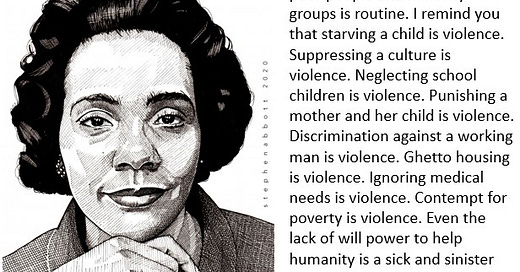







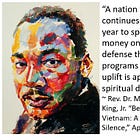


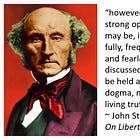


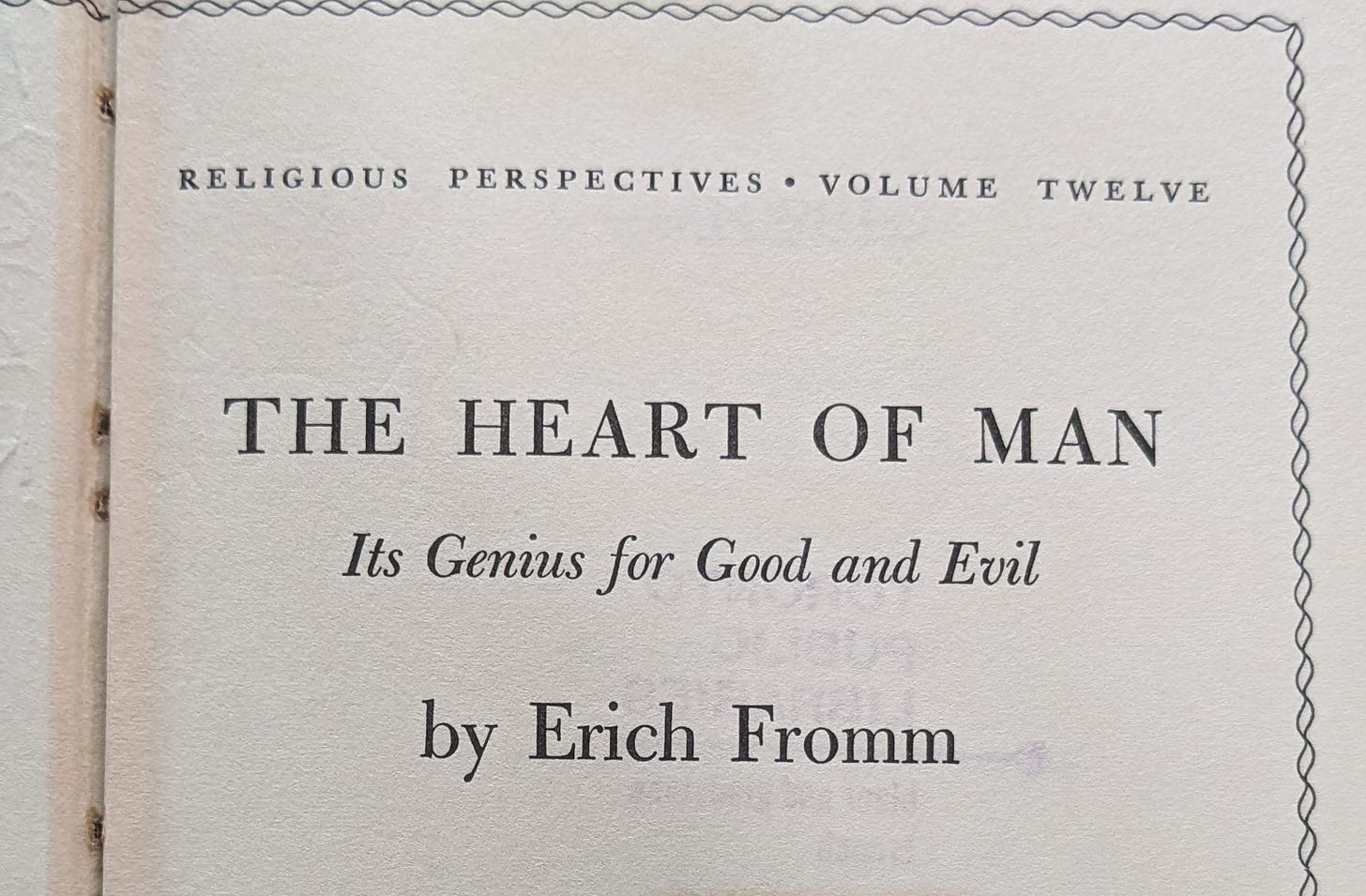



thank you for the link, this is a post full of information! Warmest wishes this holiday season ♥️
Nice piece!
I wrote about Engels’ concept of social murder recently too—elaborating also on how Marx’s analysis in “Capital” further informs our understanding of that concept: https://marxandfriends.substack.com/p/engels-marx-and-the-concept-of-social